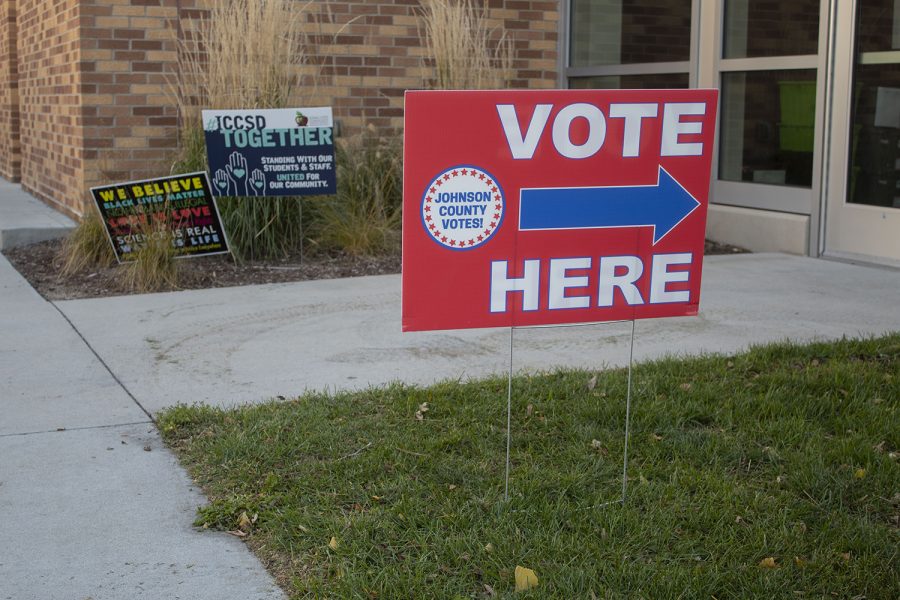Opinion | Get out to vote: Local elections need you
Make your voice heard. Get out to the polls for local elections this November.
Pictured on Nov. 3, 2020, Election Day, is Longfellow Elementary School in Iowa City. Longfellow has set up voting booths for voters to cast their ballots. (Grace Smith/The Daily Iowan)
October 12, 2021
Do you have a plan for getting out to the polls this November? Seriously, the election is happening next month.
If you were unaware of the upcoming municipal election in Iowa City, you are not alone. In comparison to general elections, fewer voters turn out for local elections. On average, only 15 to 27 percent of eligible voters cast their vote in local elections. However, local elections need your vote.
This year, Iowa City is set with an impressive stock of candidates.
In the race for city council, three candidates are running for two-at-large seats: Mayor Bruce Teague, Megan Alter, and Jason Glass. Alongside these candidates, Shawn Harmsen is running unopposed for a seat in District B. Each candidate has campaigned on different issues that are central to Iowa City.
When Teague announced his plan for reelection, he spoke on a message he called the “Black Lives Matter revolution” and plans to bring racial justice to Iowa City.
Alter has centered her campaign around strengthening three issues central to Iowa City: equity, economy, and community. She said all three ideas are mutually connected.
Finally, Glass has emphasized the importance of investing in the future and growth of Iowa City.
City councils have the final vote in passing laws and approving the city budget. They can develop initiatives for city planning, make changes to city code, and approve or reject key department heads. The decisions the city council makes are central and prominent in the daily lives of citizens in Iowa City.
Candidates for the Iowa City Community School District School Board are also on the ballot this November. Six candidates are running for four open positions on the board.
The board oversees both the big picture and day-to-day operations in the 14,500-student school district. The decisions the school board makes will directly influence the children of Iowa City and therefore its future.
This comes at a time where the board will vote on important COVID-19 policies in schools, such as mandating masks and setting other COVID-19 related precautions.
Your vote is vital in promoting safety and education in schools.
The national 2020 general election had record high voter turnout, proving that voters want their voices heard. In Johnson County, 84,000 people voted in the general election. However, many do not show up at the local level. In fact, only 15.2 percent of eligible voters showed up in Iowa City’s 2017 municipal election.
Local elections receive far less media coverage for candidates. Because of budgetary limitations, candidates must rely on smaller platforms to campaign, such as local news coverage, flyers, community events and yard signs. As a result, many are unaware of the candidates and their policies.
Many are also unaware of local elections because they fall in between general elections. While this is ideally set so voters can solely focus on municipal issues, many tend to overlook local politics.
Additionally, there are obstacles to voting that are brought on by policies. Gov. Kim Reynolds signed Senate File 413 into law in March, which shortened the early-voting time frame and closed polls an hour earlier. Because this policy shortens the voting time frame, fewer voters are likely to make it to the polls.
But local elections are equally important as general elections.
Unlike general elections where your vote is one of hundreds of millions, your vote is one of just thousands in local elections. While every vote matters in all elections, local elections especially are dependent on every single vote.
Active voter participation is vital to accurately representing the demographics of the community and the diversity of its citizens’ needs. If voter participation is only representative of a small group of people, local leaders will reflect a small segment of the community — which demonstrates underrepresentation of the community at large.
Local elections need your voice. Get out to vote on Nov. 2.
Columns reflect the opinions of the authors and are not necessarily those of the Editorial Board, The Daily Iowan, or other organizations in which the author may be involved.















